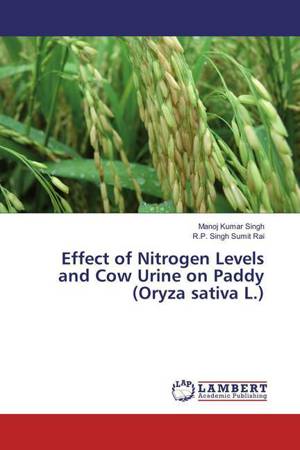
- Afhalen na 1 uur in een winkel met voorraad
- Gratis thuislevering in België vanaf € 30
- Ruim aanbod met 7 miljoen producten
- Afhalen na 1 uur in een winkel met voorraad
- Gratis thuislevering in België vanaf € 30
- Ruim aanbod met 7 miljoen producten
Zoeken
Effect of Nitrogen Levels and Cow Urine on Paddy (Oryza sativa L.)
Manoj Kumar Singh, R.P. Singh Sumit Rai
Paperback | Engels
€ 39,45
+ 78 punten
Omschrijving
To feed the projected population of 1.41 billion by 2025, India needs to produce at least 350 million tonnes of food grains. The expanded food needs of future must be met through intensive agriculture without much expansion in the arable land. The decline in growth rate of productivity of major crops as well as rate of response of crops to added fertilizer under intensive cropping system have possibly resulted from deterioration in physical, chemical and biological quality of soils. Among different organic sources cow urine may be a source of nitrogen. The analysis of cow urine has shown that it contain nitrogen, sulphur, phosphate, sodium, manganese, carbolic acid, iron, silicon, chlorine, salt, vitamins, A, B, C,D & E mineral lactose, enzyme hormone as well as gold acids. Keeping above facts in view the present experiment was conducted to study the effect of nitrogen levels and cow urine on growth and yield of paddy and on available nitrogen status of soil, nitrogen content and uptake of paddy.
Specificaties
Betrokkenen
- Auteur(s):
- Uitgeverij:
Inhoud
- Aantal bladzijden:
- 56
- Taal:
- Engels
Eigenschappen
- Productcode (EAN):
- 9783659864469
- Uitvoering:
- Paperback
- Afmetingen:
- 150 mm x 220 mm

Alleen bij Standaard Boekhandel
+ 78 punten op je klantenkaart van Standaard Boekhandel
Beoordelingen
We publiceren alleen reviews die voldoen aan de voorwaarden voor reviews. Bekijk onze voorwaarden voor reviews.











